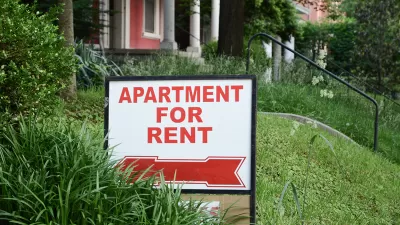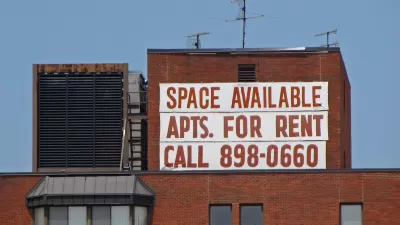An apartment-hunting website that highlights landlords' credibility has not earned their cooperation.

"I've lived in buildings where I never even knew who owned the place," Ronda Kaysen writes in the New York Times. "I only knew the management company, and even that was a little vague."
That experience may be familiar to renters. But while tenants are subject to scrutiny, they're required to trust landlords on faith, Kaysen points out.
In New York, a young company called Rentlogic is attempting to level the playing field by providing tenants with more information during the apartment hunt stage. The searchable site analyzes the history of individual properties, as well as the portfolios of landlords and property managers, to produce a letter grade for every listing.
But backlash from landlords has already prompted New York’s largest real-estate firm to withdraw all its listings after just eight days.
Landlords balked partly because Rentlogic tracks data for seven years — as long as a renter’s credit history — and a building might have been owned or managed by a different company when problems occurred.
To that, Kaysen retorts: "Renters have long been judged by data that does not tell the full story."
A tenant whose ex-husband ruined her credit with a voracious spending habit still has to live with that poor credit score for seven years. Or, if a tenant went to housing court, her name could permanently end up on a tenant-screening database known as the tenant blacklist, even if she prevailed in court.
New York has recently seen efforts to limit or regulate the tenant blacklists, although it is still in use.
FULL STORY: Why Isn’t There a Landlord Blacklist?

Planetizen Federal Action Tracker
A weekly monitor of how Trump’s orders and actions are impacting planners and planning in America.

Restaurant Patios Were a Pandemic Win — Why Were They so Hard to Keep?
Social distancing requirements and changes in travel patterns prompted cities to pilot new uses for street and sidewalk space. Then it got complicated.

Map: Where Senate Republicans Want to Sell Your Public Lands
For public land advocates, the Senate Republicans’ proposal to sell millions of acres of public land in the West is “the biggest fight of their careers.”

Maui's Vacation Rental Debate Turns Ugly
Verbal attacks, misinformation campaigns and fistfights plague a high-stakes debate to convert thousands of vacation rentals into long-term housing.

San Francisco Suspends Traffic Calming Amidst Record Deaths
Citing “a challenging fiscal landscape,” the city will cease the program on the heels of 42 traffic deaths, including 24 pedestrians.

California Homeless Arrests, Citations Spike After Ruling
An investigation reveals that anti-homeless actions increased up to 500% after Grants Pass v. Johnson — even in cities claiming no policy change.
Urban Design for Planners 1: Software Tools
This six-course series explores essential urban design concepts using open source software and equips planners with the tools they need to participate fully in the urban design process.
Planning for Universal Design
Learn the tools for implementing Universal Design in planning regulations.
Heyer Gruel & Associates PA
JM Goldson LLC
Custer County Colorado
City of Camden Redevelopment Agency
City of Astoria
Transportation Research & Education Center (TREC) at Portland State University
Camden Redevelopment Agency
City of Claremont
Municipality of Princeton (NJ)





























